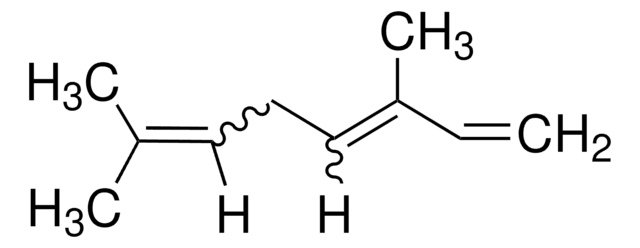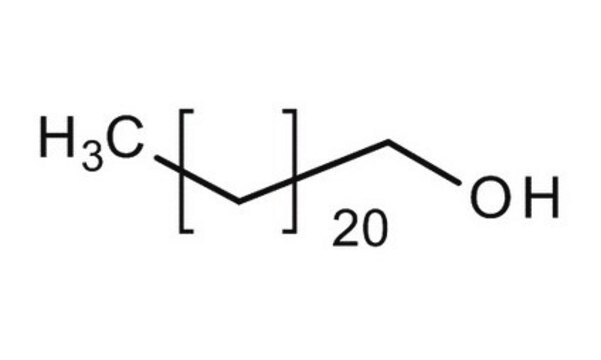T3777
1-Triacontanol
≥98% (capillary GC)
Synonym(s):
1-Hydroxytriacontane, Melissyl alcohol
Sign Into View Organizational & Contract Pricing
All Photos(3)
About This Item
Linear Formula:
CH3(CH2)28CH2OH
CAS Number:
Molecular Weight:
438.81
Beilstein/REAXYS Number:
1711965
EC Number:
MDL number:
UNSPSC Code:
12352104
PubChem Substance ID:
NACRES:
NA.25
Recommended Products
assay
≥98% (capillary GC)
form
powder
mp
86-87 °C (lit.)
storage temp.
2-8°C
SMILES string
CCCCCCCCCCCCCCCCCCCCCCCCCCCCCCO
InChI
1S/C30H62O/c1-2-3-4-5-6-7-8-9-10-11-12-13-14-15-16-17-18-19-20-21-22-23-24-25-26-27-28-29-30-31/h31H,2-30H2,1H3
InChI key
REZQBEBOWJAQKS-UHFFFAOYSA-N
Looking for similar products? Visit Product Comparison Guide
Application
- The Relationships between Waxes and Storage Quality Indexes of Fruits of Three Plum Cultivars.: This study examines how 1-Triacontanol affects the storage and quality of plums. By analyzing waxes that include 1-Triacontanol, the research helps understand its impact on extending the shelf life of fruits, which is crucial for agricultural economics and food sustainability (Zhu et al., 2023).
- Mitigation of salt stress in Indian mustard (Brassica juncea L.) by the application of triacontanol and hydrogen sulfide.: This research explores the use of 1-Triacontanol to alleviate salt stress in Indian mustard plants, offering insights into how it enhances plant growth under stress conditions. Such studies are vital for improving crop resilience to environmental stresses, thus contributing to sustainable agriculture practices (Verma et al., 2023).
- The Effect of the Stress-Signalling Mediator Triacontanol on Biochemical and Physiological Modifications in Dracocephalum forrestii Culture.: The study delves into how 1-Triacontanol acts as a stress mediator in plant cultures, highlighting its potential to induce biochemical and physiological changes that could lead to enhanced secondary metabolite production in medicinal plants (Weremczuk-Jezyna et al., 2022).
- Triacontanol priming as a smart strategy to attenuate lead toxicity in Brassica oleracea L.: This investigation shows the effectiveness of 1-Triacontanol in mitigating lead toxicity in plants, providing a strategy to protect crops from heavy metal contamination, thereby ensuring food safety and environmental health (Ahmed et al., 2023).
Storage Class
11 - Combustible Solids
wgk_germany
nwg
flash_point_f
Not applicable
flash_point_c
Not applicable
ppe
Eyeshields, Gloves, type N95 (US)
Choose from one of the most recent versions:
Already Own This Product?
Find documentation for the products that you have recently purchased in the Document Library.
Customers Also Viewed
M K Akitha Devi et al.
Indian journal of experimental biology, 50(10), 729-734 (2012-12-12)
Development of a reproducible, versatile and efficient in vitro plant regeneration system is highly warranted for Indian soybean varieties for their mass multiplication in view of their commercial significance. Accordingly a protocol for direct shoot organogenesis in soybean variety JS
Shijie Du et al.
Natural product research, 23(14), 1316-1321 (2009-09-08)
A new lactone was isolated from the leaves of Xylocarpus granatum, along with three known compounds: triacontanol, beta-sitosterol and kaempferol-3-O-beta-D-glucoside. Its structure was elucidated as 3-(1-hydroxyethyl)-4,4-dimethyl-4-butyrolactone (1) by infrared, (1)H and (13)C NMR and ESI-MS data. At a concentration of
Xiao-Dong Jia et al.
Zhong yao cai = Zhongyaocai = Journal of Chinese medicinal materials, 31(7), 988-990 (2008-11-01)
To study the chemical constituents of flower buds of Lonicera macranthoides. The 90% EtOH extract of Lonicera macranthoides. was successively partitioned with petroleum ether and ethyl acetete. Repeated column chromatography of the ethyl acetete fraction afforded the following compounds (1-9):
Muhammad Arif Lodhi et al.
Natural product research, 21(8), 721-725 (2007-07-10)
The mechanism of inhibition of jack bean and Bacillus pasteurii ureases was investigated by triacontanyl palmitate (1) which is a long-chain fatty ester and has been isolated from Symplocos racemosa Roxb. Lineweaver-Burk, Dixon plots, and their secondary replots showed that
Krishnamurthy Ramanarayan et al.
Journal of plant physiology, 161(4), 489-492 (2004-05-07)
Triacontanol (TRIA), a long chain aliphatic alcohol (C30H61OH) reverses the effect of jasmonic acid (JA) in inducing proteinase inhibitors (PIs) in tomato leaves. Porcine pancreas trypsin and Spodoptera litura gut proteinases were inhibited in the presence of leaf proteins treated
Our team of scientists has experience in all areas of research including Life Science, Material Science, Chemical Synthesis, Chromatography, Analytical and many others.
Contact Technical Service











